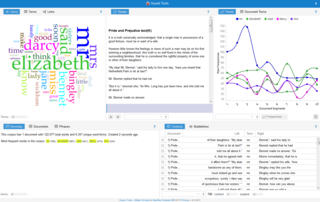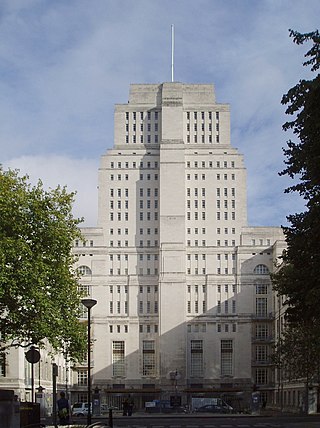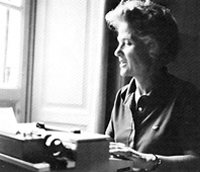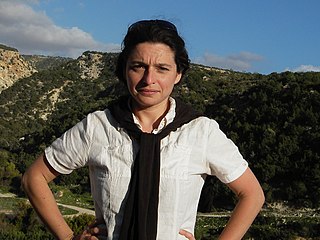Related Research Articles
The School of Advanced Study (SAS), a postgraduate-only institution of the University of London, is the UK's national centre for the promotion and facilitation of research in the humanities and social sciences. It was established in 1994 and is based in Senate House, in Bloomsbury, central London, close to the British Museum, British Library and several of the colleges of the University of London. The School brings together nine research institutes, many of which have long histories, to provide a wide range of specialist research services, facilities and resources. It offers taught master's and research degrees in humanities and social science subjects.

The Institute of Latin American Studies (ILAS) was one of nine research institutes that comprised the School of Advanced Study at the University of London. It was located in the landmarked Senate House building in Bloomsbury, central London.

The UK Web Archive is a consortium of the six UK legal deposit libraries which aims to collect all UK websites at least once each year.
The Digital Preservation Coalition (DPC) is a UK-based charity that works with global partners to 'a welcoming and inclusive global community, working together to bring about a sustainable future for our digital assets'.

Richard Ovenden is a British librarian and author. He currently serves as the 25th Bodley's Librarian in the University of Oxford, having been appointed in 2014. Ovenden also serves as the Director of the Bodleian Library's Centre for the Study of the Book and holds a Professorial Fellowship at Balliol College. Ovenden is a trustee of the Chawton House Library and vice-chair of the Kraszna-Krausz Foundation. In 2009, he was elected third chair of the Digital Preservation Coalition, succeeding Ronald Milne and Dame Lynne Brindley in a post he held until 2013. and returning in 2015 to the honorary position of President of the DPC. He was elected to the American Philosophical Society in 2015. He is a Fellow of the Society of Antiquaries of London, having been elected in 2008.
David A. Carpenter is an English historian and writer, and Professor of Medieval History at King's College London where he has been working since 1988. Carpenter specialises in the life and reign of Henry III. Historian Dan Jones described him as "one of Britain's foremost medievalists".

Digital humanities (DH) is an area of scholarly activity at the intersection of computing or digital technologies and the disciplines of the humanities. It includes the systematic use of digital resources in the humanities, as well as the analysis of their application. DH can be defined as new ways of doing scholarship that involve collaborative, transdisciplinary, and computationally engaged research, teaching, and publishing. It brings digital tools and methods to the study of the humanities with the recognition that the printed word is no longer the main medium for knowledge production and distribution.

The Senate House Libraries (SHL), formerly The University of London Research Library Services, was a group of libraries based in Bloomsbury which together comprised an extensive research collection across the humanities and social sciences. It existed under this name from 2011 to 2013.

Elizabeth Lewisohn Eisenstein was an American historian of the French Revolution and early 19th-century France. She is well known for her work on the history of early printing, writing on the transition in media between the era of 'manuscript culture' and that of 'print culture', as well as the role of the printing press in effecting broad cultural change in Western civilization.
Web archiving is the process of collecting portions of the World Wide Web to ensure the information is preserved in an archive for future researchers, historians, and the public. Web archivists typically employ web crawlers for automated capture due to the massive size and amount of information on the Web. The largest web archiving organization based on a bulk crawling approach is the Wayback Machine, which strives to maintain an archive of the entire Web.
The Humanities Advanced Technology and Information Institute (HATII) was a research and teaching institute at the University of Glasgow in Scotland. It was established in 1997 with Professor Seamus Ross as Founding Director until 2009. HATII led research in archival and library science and in information/knowledge management. Research strengths were in the areas of humanities computing, digitisation, digital curation and preservation, and archives and records management.

The Digital Classicist is a community of those interested in the application of digital humanities to the field of classics and to ancient world studies more generally. The project claims the twin aims of bringing together scholars and students with an interest in computing and the ancient world, and disseminating advice and experience to the classics discipline at large. The Digital Classicist was founded in 2005 as a collaborative project based at King's College London and the University of Kentucky, with editors and advisors from the classics discipline at large.
David Freedberg is Pierre Matisse Professor of the History of Art and Director of the Italian Academy for Advanced Studies in America at Columbia University. He was also Director of the Warburg Institute at the University of London from July 2015 to April 2017.
Digital history is the use of digital media to further historical analysis, presentation, and research. It is a branch of the digital humanities and an extension of quantitative history, cliometrics, and computing. Digital history is commonly digital public history, concerned primarily with engaging online audiences with historical content, or, digital research methods, that further academic research. Digital history outputs include: digital archives, online presentations, data visualizations, interactive maps, timelines, audio files, and virtual worlds to make history more accessible to the user. Recent digital history projects focus on creativity, collaboration, and technical innovation, text mining, corpus linguistics, network analysis, 3D modeling, and big data analysis. By utilizing these resources, the user can rapidly develop new analyses that can link to, extend, and bring to life existing histories.
Marilyn Deegan is the former Director of Research Development at the former Centre for Computing in the Humanities, now the Department of Digital Humanities), King's College London.
The Department of Information Studies is a department of the UCL Faculty of Arts and Humanities.

The Department of Classics is an academic division in the Faculty of Arts and Humanities at King's College London. It is one of the oldest and most distinguished university departments specialising in the study of classical antiquity in the United Kingdom.

Elena Isayev is Professor of Ancient History and Place in the Classics and Ancient History Department at the University of Exeter. She is an expert on migration, hospitality and displacement, particularly in ancient Mediterranean contexts. She works with Campus in Camps in Palestine and she is a Trustee of the charity Refugee Support Devon.

Lorna M. Hughes has been Professor in Digital Humanities at the University of Glasgow since 2015. From 2016 to 2019, she oversaw the redevelopment of the Information Studies subject area The re-launch was marked by an international symposium at the University of Glasgow in 2017.
Jane Geddes is a British art historian and academic, specialising in Scottish architecture, British Medieval manuscripts, Pictish sculpture and Medieval decorative ironwork. She is Emeritus Professor of Art History, University of Aberdeen.
References
- ↑ School of Advanced Study reaffirms commitment to digital research. Matthew Reisz, Times Higher Education Supplement , 8 January 2015. Retrieved 8 February 2016.
- ↑ "Professor Jane Winters | University of London". research.london.ac.uk. Retrieved 11 August 2024.
- ↑ Winters, Jane Frances (1999). The forest eyre, 1154-1368 (Thesis). King's College London.
- ↑ Council members. Royal Historical Society. Retrieved 3 February 2017.
- ↑ "Professor Jane Winters | School of Advanced Study". research.sas.ac.uk. Retrieved 30 May 2019.
- ↑ Editorial team. Open Library of Humanities. Retrieved 3 February 2017.
- ↑ "Professor Winters joins UNESCO's UK Memory of the World Committee". School of Advanced Study. 5 July 2017. Retrieved 30 May 2019.
- ↑ "The Digital Preservation Coalition welcomes Jane Winters as New Chair of the DPC Board". Digital Preservation Coalition. DPC. Retrieved 6 December 2023.